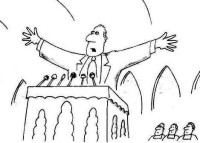 Religious Differences With Regard to Bases of Power
Religious Differences With Regard to Bases of PowerReligions differ in the bases of power that are utilized by the clergy and that are ascribed to God. We can see it in the language that different religious groups use. When good, religious people are described as "God-fearing," this suggests that for that religious group God's coercive power is predominant. The architecture of places of worship also seems to imply bases of power. Compare the imposing and overwhelming Gothic cathedrals of the Roman Catholic church, with the priest in a pulpit well above the parishioners, or the magnificent mosques of Islam, with the simple Quaker meeting house, with the congregants sitting in a circle, and encouraged to express their individual beliefs about morality. The former would appear to give the individual worshipper a sense of relative insignificance and relative powerlessness, a message that is also strengthened in prayers and in the holy works.
We must keep in mind that at the time of the development of written scripture of the Bible and the Koran, all but a chosen few were illiterate and uneducated. The emphasis on a Supreme Being, who expected obedience without question, relying on His extreme coercive power, reward power, unquestioned expert power, and various forms of legitimate power, was likely effective in determining the behavior of many, if not all of those who accepted His existence. But as humankind became more literate, educated, and knowledgeable, such forms of power became more difficult to accept. Religious authorities, and the temporal powers who supported them, were threatened by such independent thought. Any new ideas that were counter to the literal statement in the Holy Works were seen as threatening the entire system and undermining the very foundations of what was seen as necessary to maintain and continue that way of life. It seems that such deviations were especially threatening at times when the system was menaced by other dangers.
In the 12th century and for a period thereafter, lands under Moslem rule flourished in new scientific and philosophical developments. Many of these discoveries would have questioned the literal words of the Bible and the Koran. In the 15th century, Islam had suffered a number of defeats in Spain, through the Mongol invasions and elsewhere. It was then that schools of Islamic studies decreed that "the gates of independent reasoning had been closed"; reliance on informational power and on the expert power of those not part of religious orthodoxy was forbidden in religious and other practices, including the sciences. "Henceforth Muslims should practice emulation of the great luminaries of the past, especially in study of Shariah, the Holy Law." The emphasis was to extend Shariah to all circumstances in which Muslims were likely to find themselves (Armstrong, 1993, p. 258).
Evidence of responses to the threat of informational power to the established order is represented in various other critical events, such as the inquisition trial and imprisonment of Galileo, whose heliocentric theory was thought to contradict the word of God in scripture. Later in the 17th century, the Dutch Jewish philosopher Baruch Spinoza was ostracized and cursed by the Jewish community. Though he believed in God, he felt that an understanding of God and religion through logical philosophical analysis should be accepted over a literal acceptance of the words in the Bible. Such examples of the punishment of religious deviants, including those who advocated informational power in the greater service of humanity and knowledge, have been repeated innumerable times.(8)
Social Power Strategies and Differences in Moral Reasoning
Much of what we have been discussing thus far is based on assumptions that few of us would question: From our own experience, and supported by various studies, we know that people differ in their tendencies to respond to one form of influence strategy as compared to another, though this might vary with the situation. We might expect that a person who has low self-confidence will be less likely to respond to informational power, somewhat more likely to respond to expert power - in fact, even when the influencing agent gives good reasons, the person with low self-esteem may decide to comply, but attribute such compliance to expert power. According to the classic definition, a psychopathic personality (more recently called an antisocial personality), when it comes to issue of "moral" or "immoral" behavior, would be more likely to respond to coercive power and reward power, less likely to comply because of informational power (showing logically that undesirable behavior is inconsistent with certain social values), or because of referent power or legitimate power. The power strategies utilized by an influencing agent will also be determined by personal predilections and a conception of the bases of power to which the target would respond. Often, of course, these will be related to the bases of power to which the agent would respond if s/he were the target. It would not be a big step to go from there to a further assumption that both the influence strategies chosen and the strategies to which a target of influence would respond are determined by personality and by culture.
Several years ago, Lawrence Kohlberg (1964, 1984), following the earlier works of Piaget (1932), developed a six-stage model of the development of complexity in moral reasoning, the ways in which various people might determine what behavior is "good" or "bad." Kohlberg, in the tradition of Piaget, examined moral development according to how these are determined at various age levels, but adding that people sometimes are fixated at the lower stages and levels with few people actually reaching stage 6, the most mature and developed stage of moral reasoning. These are summarized in Table 4.
Go to Part 8